 |
| Overall installation rough |
" Oceans occupy 70% of the total surface area of the Earth and over 90% of the living space on the planet.
It is said that humans have managed to explore only about 5% of the ocean floor. The remaining 95% of the ocean still remains a mystery. "
from the WorldAtlas web siteHow much will be lost to our understanding - destroyed before we ever view it?
Are these plants - or some strange animals? Clustered together on the ocean floor, the group emerges, currents sweeping them all to one direction.
At the time I had proposed Last to Sea, I was not entirely sure how to represent 'the Unknown' within the overall collection. Into early May, as I have been working to complete this overall piece, I have also been involved in a weather vane project. The deadlines for both have shifted to overlapping and extending, pulling my attention from one project to the other. With bits of time stolen between working sessions on the weather vane, I had gathered some pieces from earlier sculptures that I thought I could pull together into a new element.
|
|
'Spines' was more a concept / maquette for what would have worked much better on a monumental scale. A series of 1/4 inch diameter round rods supported the 'floating' stone slab.
'Suess-icle' was one of a number of similar pieces I had made and offered at what turned out to be my last year at Summerfolk. These had started as a forging exercise at a workshop session in February of that year with my close friend David Robertson.
While I had been playing with potential designs related to 'Last to Sea' I had roughed out some organic shapes, inspired from plant forms and my past work forging structural pipe.
I already had the central 'Suess-icle' piece. This was re-forged to suit the size of the based stone, and fit to the overall line of the grouping.
 |
| First stage in the forging |
 |
| Elements combined, before welding together |
A second element was a short length of 1/4 round stock, drawn to a cylindrical point, then formed into a small spiral, and given a slight set of curves.
The outer shell elements were then cut off into the bottom of the crimped area, and the central stem pieces inserted.
These were MIG welded together. The combined units were returned to the forge, and the line marking that joint hammered with the ball peen against over the horn to blend the contours. The stems were then bent into a distorted L shape, each randomly curved.
Three pieces of flat bar were forged to match the alignment of the holes in the stone. The individual elements were then inserted, then welded in place to these strips on the underneath side.
Once all fixed in place, some final adjustment was done by heating individual stems with the oxy-propane torch and tweeking for position and direction within the larger grouping.
 |
| 'Unknown' as completed |
Next up ; 'Tiny Fishes'


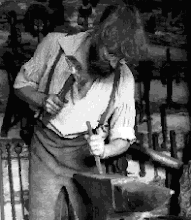
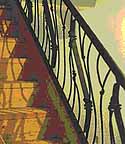
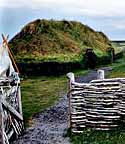
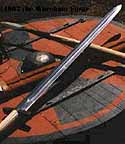
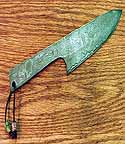















No comments:
Post a Comment